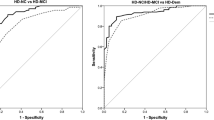Abstract
Cognitive complaint interviews (CCI) have been shown to be useful in the early detection of dementia in elderly people. Surprisingly, CCIs are rarely used in Parkinson’s disease (PD), despite a six-fold higher risk of dementia than in healthy subjects. The present study sought to determine whether a structured CCI could detect cognitive decline in PD. A validated CCI was added to the usual clinical interview for 180 PD patients. Objective cognitive status was assessed by the Mattis dementia rating scale score. The CCIs ability to detect cognitive decline in PD patients was determined using a receiver operating characteristic (ROC) curve. 58 (32.22%) patients had a significant, subjective cognitive complaint (CCI score >3). Of these, 48.27% had objective cognitive decline. Objective cognitive decline was significantly more frequent in the patients with subjective cognitive complaint. However, the ROC curve for discriminating between patients with and without objective cognitive deficits as a function of their subjective cognitive complaint had low sensitivity (0.50, 95% CI: 0.36–0.64) and moderate specificity (0.74, 95% CI: 0.69–0.84). Logistic regression incorporating the main demographical and clinical variables showed that the CCI score’s discriminant power was improved by adding age and the number of years in education to the predictive model. Objective cognitive decline and dementia are more frequent among PD patients reporting a cognitive complaint than among patients not reporting a complaint. However, the CCI does not enable more accurate screening for PD-associated dementia.



Similar content being viewed by others
References
Dujardin K et al (1999) Neuropsychological abnormalities in first degree relatives of patients with familial Parkinson’s disease. J Neurol Neurosurg Psychiatry 67(3):323–328
Muslimovic D et al (2005) Cognitive profile of patients with newly diagnosed Parkinson disease. Neurology 65(8):1239–1245
Emre M (2003) Dementia associated with Parkinson’s disease. Lancet Neurol 2(4):229–237
Emre M (2004) Dementia in Parkinson’s disease: cause and treatment. Curr Opin Neurol 17(4):399–404
Bosboom JL, Stoffers D, Wolters E (2004) Cognitive dysfunction and dementia in Parkinson’s disease. J Neural Transm 111(10–11):1303–1315
Martinez-Martin P et al (2005) Quality of life of caregivers in Parkinson’s disease. Qual Life Res 14(2):463–472
Buter TC et al (2008) Dementia and survival in Parkinson disease: a 12-year population study. Neurology 70(13):1017–1022
Parashos SA et al (2002) Medical services utilization and prognosis in Parkinson disease: a population-based study. Mayo Clin Proc 77(9):918–925
Emre M et al (2004) Rivastigmine for dementia associated with Parkinson’s disease. N Engl J Med 351(24):2509–2518
Bak TH et al (2005) Cognitive bedside assessment in atypical Parkinsonian syndromes. J Neurol Neurosurg Psychiatry 76(3):420–422
Athey RJ, Walker RW (2006) Demonstration of cognitive decline in Parkinson’s disease using the Cambridge cognitive assessment (Revised CAMCOG-R). Int J Geriatr Psychiatry 21(10):977–982
Zadikoff C et al (2008) A comparison of the mini mental state exam to the montreal cognitive assessment in identifying cognitive deficits in Parkinson’s disease. Mov Disord 23(2):297–299
Marinus J et al (2003) Assessment of cognition in Parkinson’s disease. Neurology 61(9):1222–1228
Schmand B et al (1996) Subjective memory complaints may announce dementia. Neurology 46(1):121–125
Schofield PW et al (1997) The validity of new memory complaints in the elderly. Arch Neurol 54(6):756–759
Gagnon M et al (1994) Self-reported memory complaints and memory performance in elderly French community residents: results of the PAQUID Research Program. Neuroepidemiology 13(4):145–154
Thomas-Anterion C. et al. (2003) Le questionnaire de plainte cognitive: un outil de recherche de plainte suspecte d’évoquer une maladie d’Alzheimer? L’année gérontologique 56–65
Miranda B et al (2008) Self-perceived memory impairment and cognitive performance in an elderly independent population with age-related white matter changes. J Neurol Neurosurg Psychiatry 79(8):869–873
Gelb DJ, Oliver E, Gilman S (1999) Diagnostic criteria for Parkinson disease. Arch Neurol 56(1):33–39
Marsh L et al (2006) Provisional diagnostic criteria for depression in Parkinson’s disease: report of an NINDS/NIMH work group. Mov Disord 21(2):148–158
Thomas-Anterion C, Honore-Masson S, Laurent B (2006) The cognitive complaint interview. Psychogeriatrics 6(1):18–22
Montgomery SA, Asberg M (1979) A new depression scale designed to be sensitive to change. Br J Psychiatry 134:382–389
Monsch AU et al (1995) Clinical validity of the Mattis dementia rating scale in detecting dementia of the Alzheimer type. A double cross-validation and application to a community-dwelling sample. Arch Neurol 52(9):899–904
Brown GG et al (1999) Validity of the dementia rating scale in assessing cognitive function in Parkinson’s disease. J Geriatr Psychiatry Neurol 12(4):180–188
Green RC, Woodard JL, Green J (1995) Validity of the Mattis dementia rating scale for detection of cognitive impairment in the elderly. J Neuropsychiatry Clin Neurosci 7(3):357–360
Emre M et al (2007) Clinical diagnostic criteria for dementia associated with Parkinson’s disease. Mov Disord 22(12):1689–1707 quiz 1837
Van der Linden M (2004) L’épreuve de rappel libre/rappel indicé à 16 items (RL/RI-16). In: Van der Linden M, Gremem et al (eds) L’évaluation des troubles de la mémoire. Solal, Marseille, pp 25–47
Pillon B et al (1993) Explicit memory in Alzheimer’s, Huntington’s, and Parkinson’s diseases. Arch Neurol 50(4):374–379
Dujardin K et al (2001) Memory and executive function in sporadic and familial Parkinson’s disease. Brain 124(Pt 2):389–398
Rouch I et al (2008) Cognitive complaints, neuropsychological performance and affective disorders in elderly community residents. Disabil Rehabil 30(23):1794–1802
Conflicts of interest statement
The authors report no conflicts of interest.
Author information
Authors and Affiliations
Corresponding author
Rights and permissions
About this article
Cite this article
Dujardin, K., Duhamel, A., Delliaux, M. et al. Cognitive complaints in Parkinson’s disease: its relationship with objective cognitive decline. J Neurol 257, 79–84 (2010). https://doi.org/10.1007/s00415-009-5268-2
Received:
Revised:
Accepted:
Published:
Issue Date:
DOI: https://doi.org/10.1007/s00415-009-5268-2




